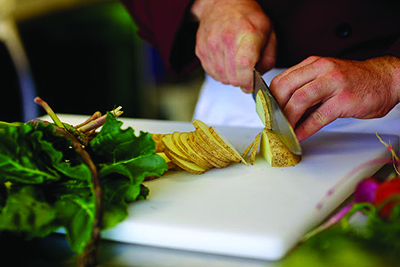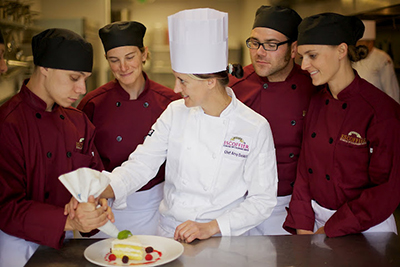Written By Ryan Hodros, Pastry Arts Student
 An article was brought to my attention last week that brought to mind a great deal of what was taught during my time in the Pastry Arts program. (If you’re interested in the full article, Culinary Educators Dish on The Next Generation of Chefs). The article discusses a survey conducted by culinaryvisions.org where they asked people in culinary education, both students and instructors, on aspects of the culinary field.
An article was brought to my attention last week that brought to mind a great deal of what was taught during my time in the Pastry Arts program. (If you’re interested in the full article, Culinary Educators Dish on The Next Generation of Chefs). The article discusses a survey conducted by culinaryvisions.org where they asked people in culinary education, both students and instructors, on aspects of the culinary field.
While the article makes a number of good points, specifically about practicing local and sustainable menu development and education on modern cooking techniques, I feel that the article is asking quite a bit out of a culinary education. This is especially poignant in the articles inclusion of the bullet point “Working with a global pantry of ingredients to prepare a wide range of ethnic offerings.”
I’m not going to argue that understanding world cuisine is not important. I’ve travelled quite a bit, and in the United States alone there are dozens if not hundreds of local flavors that are absolutely worth knowing about as a culinary professional. But therein lies the problem: the more you travel, the more you realize that a comprehensive knowledge of “global cuisine” is arguable impossible during a person’s lifetime, let alone during their time in culinary school.

I spent a month in China in 2007 as part of a language learning program. The vast majority of my time was spent in Beijing as a student in one of their many universities, taking part in an immersion program. While in Beijing, I experienced a great deal of what I thought could be considered “Chinese food,” including hot pot, roast duck, dumplings (or jiaozi) and so on. I thought I was getting a decent grip on “Chinese food.”
Then we took a field trip to a village in the farmlands/mountains outside of Beijing. We’re talking a forty minute bus ride. While there, the villagers prepared us a meal consisting primarily of food they grew themselves and a pig that had been butchered at a neighboring farm. It’s no exaggeration that the food was absolutely nothing like the food I had been eating in Beijing. Not only were the ingredients fresher (and the water tasted better) but it was entirely different fare. There was less spice, but more dairy. More pickling but less sugar. And so on. My point being that, over a distance you could cover on a bicycle, Chinese cuisine changes entirely. (When we went to Xi’an for a weekend, the cuisine changed even more).
So as educators, how do you teach global cuisine within an area as relatively small as China or the United States? There’s only so much space in a curriculum, after all. An area as small as the Korean peninsula has dozens of cuisines that are all unique and interesting in their own way. As culinary students, I believe there comes a point in culinary education where one has to leave and become an adventurer in order to learn these things.

Changing the subject somewhat, I absolutely agree with the rest of the article. I went into Escoffier knowing next to nothing about local/sustainable menu development and I now have an appreciation for local food that never even factored into my thoughts before. The pragmatic way that it’s taught in the school, with one eye towards responsibility and one eye towards business, and the need to strike a balance between the two, was a real eye-opener for me.The primary reason I believe this is that the amount of international baking I was exposed to while at Escoffier was about as much variety as you could reasonably fit into a PA program. We covered a number of major cultures (including baking from South America that I honestly never knew existed) and learned a great deal about global baking. But in the grand scheme of things, it was really only dipping a toe into the worldwide pool of desserts and breads, and I think that is what culinary school should be doing for global education—exposure rather than complete education.
I’m also beginning to understand more and more about food trucks and pop-ups. Having spent some time living in Hawaii, I grew to appreciate the shrimp trucks that populate Hawaii’s north shore. The seafood is about as fresh as it can get, the owners are fun to hang around, and the fresh air and sunshine make the drive absolutely worth it.
But I always assumed it was a Hawaii thing. Sure I’d seen food trucks and stands on the Food Network and the Travel Channel, but I always assumed the things on those channels are shown more because they make good television rather than because they’re an actual trend that’s catching on. But having spent time learning about the business of restaurants, I understand the draw of these smaller venues and the importance of supporting them.
 I always assumed that the massive gulf between chef-for-hire and business-owner was the only choice. You either work for someone else, or you dive off a cliff into a sea of entrepreneurship. But in learning about these smaller venues, I came to see that there are less riskier steps between the two that leave much more room for experimentation. Rather than opening another tried-and-true but boring Applebee’s ripoff, the options for a up-and-coming culinarian are much wider with a much lower degree of risk. Correspondingly, this allows adventurers who perhaps discovered a new cuisine outside of Beijing to use his or her global knowledge to bring something brand new onto his area’s cultural banquet table!
I always assumed that the massive gulf between chef-for-hire and business-owner was the only choice. You either work for someone else, or you dive off a cliff into a sea of entrepreneurship. But in learning about these smaller venues, I came to see that there are less riskier steps between the two that leave much more room for experimentation. Rather than opening another tried-and-true but boring Applebee’s ripoff, the options for a up-and-coming culinarian are much wider with a much lower degree of risk. Correspondingly, this allows adventurers who perhaps discovered a new cuisine outside of Beijing to use his or her global knowledge to bring something brand new onto his area’s cultural banquet table!
Ultimately, in reading the article from Food & Beverage, I think it’s great that culinary educators are perhaps going a little too far in how much they want to teach the next generation of chefs. Rather than rest on their laurels, they’re looking to expand, and in many ways I think Escoffier is on the forefront of that expansion. Their focus on classical mixed with modern techniques, exposure to global cuisine, and knowledge of the nuts and bolts of restauranteurship prepares students for the culinary future, which is a facet of the education that I really appreciated.
** This was originally posted on the Escoffier website here and reprinted with permission
About Ryan Hodros
In addition to being a culinary student and blogger at the Auguste Escoffier School of Culinary Arts, Ryan Hodros is the beer writer for 303 Magazine. After graduating from Baldwin-Wallace College in Northeast Ohio with degrees in English and Religious Studies, Ryan joined the Navy where he attended the Defense Language Institute, earning an associate’s degree in Mandarin Chinese. This lead him to Hawaii, where he spent four years working as a linguist. He’s hoping to turn his education into a writing career, currently focusing on food and entertainment, but hoping to branch off into fiction.
About the Auguste Escoffier Schools of Culinary Arts
The Auguste Escoffier Schools of Culinary Arts offer professional culinary arts programs based on the methods, principles and systems of Auguste Escoffier, the international culinary icon and the source of modern cooking. Students have the opportunity to learn history and context directly from the Escoffier family, as well as from expert chef instructors.
The Schools’ Culinary Arts and Pastry Arts certificate programs offer rigorous industry skills training as well as grounding in the standards of professionalism and excellence sought by employers. Campuses are located in Austin, Texas and Boulder, Colorado. For more information please visit www.escoffier.edu.








